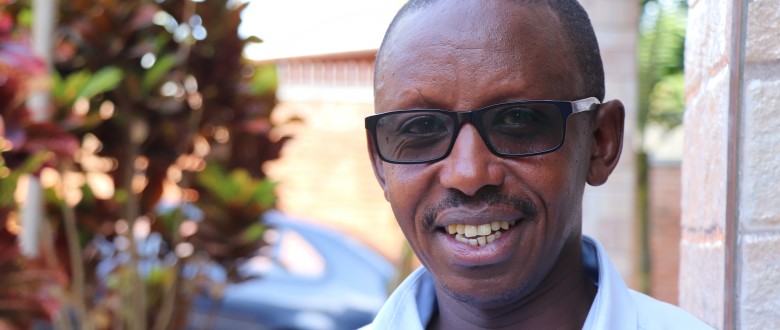
“Like many school leaders, I started my career in education as a teacher. For five years I taught at a primary school, before being promoted. Since then, I’ve held positions in different schools, before settling down in Paysannat L, a school for early childhood, primary and secondary school students. It is located in the rural district of Kirehe, in Eastern Province, not far from the Tanzanian border. Thankfully, it is only a 15-minute drive from my house by motorbike.”
“I get to work every day by 7 o’clock. My team – consisting of both teachers and administrative colleagues – and I get together first thing in the morning to discuss the day to come. At 7.30, school starts, and I usually make rounds in some classrooms to check up on my teaching staff and my learners’ progress. But I don’t get to spend too much time with them, as I have many things to do, especially since 2016.”
“In 2015, the UN built a refugee camp in Kirehe, which is now the largest camp in Rwanda hosting close to 60.000 Burundian refugees. In an effort to provide the minors with an education, we expanded our school’s infrastructure considerably in 2016 with support from the Rwandan government. I am now the school leader of 22.935 students: 19.066 Burundian nationals and 3.869 Rwandan nationals. The camp also houses many Burundian teachers. My teaching staff grew with 107, now counting 306 qualified teachers. My direct staff too is enriched with people from Burundi.”
“Holistic integration is a key strategy for our school. There used to be a language barrier – the curriculum in Rwanda is in English while most Burundians speak French – but as you know, young people are quick to learn. At home too, many Burundian children now speak English well. Integration of all learners in all aspects of school life is crucial, irrespective of their nationality. And the same goes for the teachers. They teach their subjects in English now. There are no tensions based on nationality in my school.”
“Five years ago, I enrolled in a postgraduate course for school leaders organised by VVOB at the University of Rwanda – College of Education. The course ‘Effective School Leadership’ taught me many things, including how to properly manage a school and how to develop a long-term vision, but the strategy that has had the most meaningful impact on my school is collaboration. Collaboration with and among parents, teachers, students and the wider school community.”
“For example, parents are now represented at school, and as such much more involved. My team and I organise our own trainings for members of the parent-teacher association, in which we share the lessons from the Effective School Leadership course. This ensures we are all on the same page about the direction we want our school to take.”
“Collaboration with the school community – which includes the church, local authorities and organisations for our school lunch programmes – has been a crucial factor in improving our students’ results at the national exam. In bringing different stakeholders together, our students rely on a strong, trustworthy network in which they can learn and grow.”
Click here for more information about VVOB’s current projects in Rwanda.
Born in a Rwandan refugee camp in 1976 in Burundi, Jean Paul Sebisogo came home to Rwanda for his secondary degree and university studies in Education. He has 20 years of experience in education, of which 15 as a school leader in different schools. Since 2011, Mr Sebisogo has been the school leader of Paysannat L, a basic and secondary education school which hosts close to 20.000 Burundian refugee students in the Eastern Province of Rwanda.
In 2014-2015, he was enrolled in VVOB’s diploma course Effective School Leadership at University of Rwanda – College of Education. In 2019, he was a guest speaker at Educaid.be's annual conference on 'Education and Displacement. Challenges and approaches to providing quality education to refugees and displaced people in the Global South' in Brussels.




